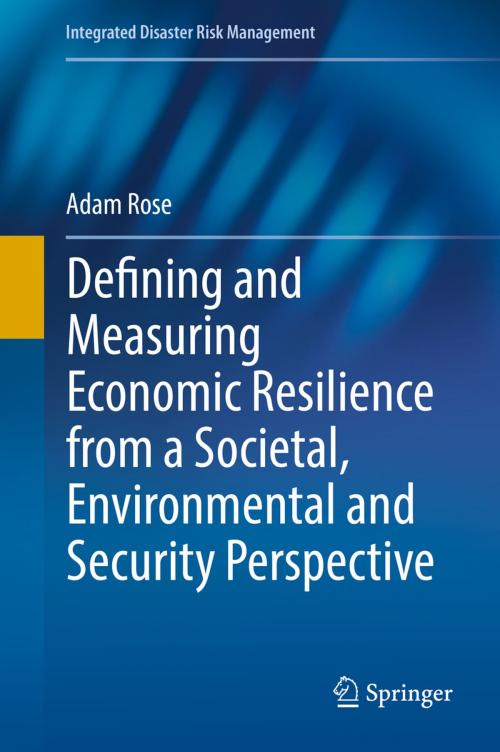Defining and Measuring Economic Resilience from a Societal, Environmental and Security Perspective
Business & Finance, Industries & Professions, Insurance, Economics| Author: | Adam Rose | ISBN: | 9789811015335 |
| Publisher: | Springer Singapore | Publication: | April 3, 2017 |
| Imprint: | Springer | Language: | English |
| Author: | Adam Rose |
| ISBN: | 9789811015335 |
| Publisher: | Springer Singapore |
| Publication: | April 3, 2017 |
| Imprint: | Springer |
| Language: | English |
This volume presents an economic framework for the analysis of resilience in relation to societal, environmental, and personal security perspectives. It offers a rigorous definition of economic resilience and an operational metric, and it shows how they can be applied to measuring and applying the concept to private and public decision making. Major dimensions of resilience and their implications for human development are explored. Resilience is emphasized as a coping mechanism for dealing with short-term crises, such as natural disasters and acts of terrorism. As well, the author shows how lessons learned in the short-run out of necessity and through the application of human ingenuity can be incorporated into long-run sustainability practices. In part, this opportunity stems from viewing resilience as a process, one that enhances individual and societal competencies.
The book links economic resilience to several other disciplines and examines the relationship between resilience and various other key concepts such as vulnerability, adaptation, and sustainability. It scrutinizes the measurement of economic resilience in terms of temporal, spatial, and scale dimensions. It examines the time-path of resilience and relates it to the recovery process.
This work also looks closely at progress on the formulation of resilience indices and stresses the importance of actionable variables. It presents a risk-management framework, including aspects of cost-effectiveness and cost-benefit analysis. Additionally, it explores the role of resilience in relation to the co-benefits of disaster risk management.
This volume presents an economic framework for the analysis of resilience in relation to societal, environmental, and personal security perspectives. It offers a rigorous definition of economic resilience and an operational metric, and it shows how they can be applied to measuring and applying the concept to private and public decision making. Major dimensions of resilience and their implications for human development are explored. Resilience is emphasized as a coping mechanism for dealing with short-term crises, such as natural disasters and acts of terrorism. As well, the author shows how lessons learned in the short-run out of necessity and through the application of human ingenuity can be incorporated into long-run sustainability practices. In part, this opportunity stems from viewing resilience as a process, one that enhances individual and societal competencies.
The book links economic resilience to several other disciplines and examines the relationship between resilience and various other key concepts such as vulnerability, adaptation, and sustainability. It scrutinizes the measurement of economic resilience in terms of temporal, spatial, and scale dimensions. It examines the time-path of resilience and relates it to the recovery process.
This work also looks closely at progress on the formulation of resilience indices and stresses the importance of actionable variables. It presents a risk-management framework, including aspects of cost-effectiveness and cost-benefit analysis. Additionally, it explores the role of resilience in relation to the co-benefits of disaster risk management.















